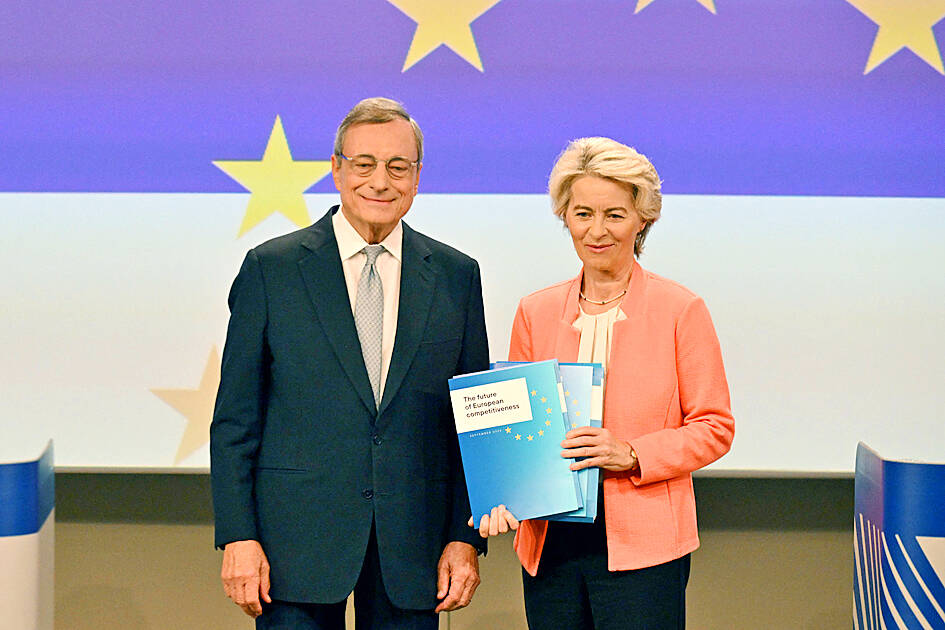The EU must massively step up spending through joint borrowing to fund investments as it lags dangerously behind the US, a keenly awaited report said yesterday.
European Commission President Ursula von der Leyen last year asked Mario Draghi, a former head of the European Central Bank, to report back on how the 27-country bloc can increase its competiveness amid rising global insecurity and economic challenges.
The report called for additional investment of at least 750 billion to 800 billion euros (US$829.32 billion to US$883.54 billion), almost 5 percent of the EU’s GDP.

Photo: AFP
“For the first time since the Cold War, we must genuinely fear for our self-preservation and the reason for a unified response has never been so compelling,” Draghi told a news conference in Brussels to present his report.
Introducing his blueprint for a “new industrial strategy” based around about 170 proposals, Draghi said “the investment needs that all this entails are massive,” but that “radical change” was needed.
Citing the bloc’s historic COVID-19 recovery fund, the former Italian prime minister said it should issue new “common debt instruments ... to finance joint investment projects that will increase the EU’s competitiveness and security.”
The EU resorted to joint borrowing for 800 billion euros to support member states’ economies hit hard by the pandemic — but the concept remains controversial.
The idea’s biggest supporter is France, but other countries including Germany and the Netherlands oppose such action, fearing they would be forced to contribute more money to make up for southern European countries.
Aware of the difficulties of his proposal, Draghi said common loans would only be possible if “the political and institutional conditions are met.”
Another solution is to better mobilize private capital in the bloc, advocating for progress on the long-stalled push for an EU “capital markets union,” he said.
Von der Leyen in July won a second five-year at the helm of the bloc’s executive arm and hopes to use the report to shape her next mandate.
Europe is entering a new era, confronted by more competition from abroad, but with reduced access to foreign markets as rivals increasingly throw up barriers to free trade, Draghi said in his report.
He pointed to the “wide gap” in economic growth that has “opened up between the EU and the US, driven mainly by a more pronounced slowdown in productivity growth in Europe.”
Draghi’s report pointed to the EU’s weakness in the emerging technologies that will drive future growth — with only four European companies among the world’s top 50 tech firms.
“Europe must become a place where innovation flourishes,” Draghi told reporters, saying the bloc was “punching under our power.”
“We could do much more if all these things were done as if we acted as a community, but we lack focus on key priorities. We don’t combine our resources to generate scale. And we do not coordinate the policies that matter,” he said.

The US dollar was trading at NT$29.7 at 10am today on the Taipei Foreign Exchange, as the New Taiwan dollar gained NT$1.364 from the previous close last week. The NT dollar continued to rise today, after surging 3.07 percent on Friday. After opening at NT$30.91, the NT dollar gained more than NT$1 in just 15 minutes, briefly passing the NT$30 mark. Before the US Department of the Treasury's semi-annual currency report came out, expectations that the NT dollar would keep rising were already building. The NT dollar on Friday closed at NT$31.064, up by NT$0.953 — a 3.07 percent single-day gain. Today,

‘SHORT TERM’: The local currency would likely remain strong in the near term, driven by anticipated US trade pressure, capital inflows and expectations of a US Fed rate cut The US dollar is expected to fall below NT$30 in the near term, as traders anticipate increased pressure from Washington for Taiwan to allow the New Taiwan dollar to appreciate, Cathay United Bank (國泰世華銀行) chief economist Lin Chi-chao (林啟超) said. Following a sharp drop in the greenback against the NT dollar on Friday, Lin told the Central News Agency that the local currency is likely to remain strong in the short term, driven in part by market psychology surrounding anticipated US policy pressure. On Friday, the US dollar fell NT$0.953, or 3.07 percent, closing at NT$31.064 — its lowest level since Jan.

The New Taiwan dollar and Taiwanese stocks surged on signs that trade tensions between the world’s top two economies might start easing and as US tech earnings boosted the outlook of the nation’s semiconductor exports. The NT dollar strengthened as much as 3.8 percent versus the US dollar to 30.815, the biggest intraday gain since January 2011, closing at NT$31.064. The benchmark TAIEX jumped 2.73 percent to outperform the region’s equity gauges. Outlook for global trade improved after China said it is assessing possible trade talks with the US, providing a boost for the nation’s currency and shares. As the NT dollar

The Financial Supervisory Commission (FSC) yesterday met with some of the nation’s largest insurance companies as a skyrocketing New Taiwan dollar piles pressure on their hundreds of billions of dollars in US bond investments. The commission has asked some life insurance firms, among the biggest Asian holders of US debt, to discuss how the rapidly strengthening NT dollar has impacted their operations, people familiar with the matter said. The meeting took place as the NT dollar jumped as much as 5 percent yesterday, its biggest intraday gain in more than three decades. The local currency surged as exporters rushed to